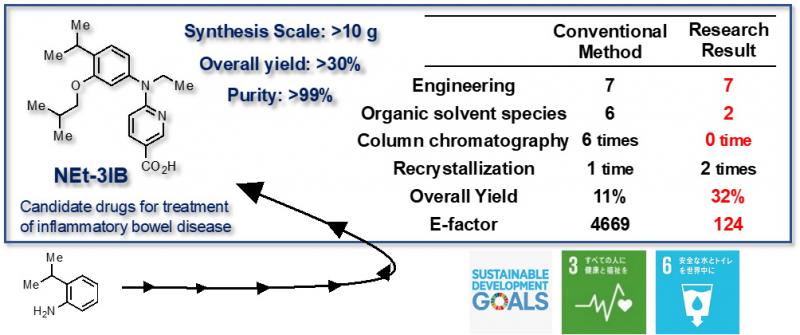◆Abstract
- Inflammatory bowel disease (IBD) is a
disease associated with diarrhea, bloody stools, and abdominal pain due
to chronic inflammation.
- A new small-molecule drug that can be
orally administered at a low cost as a treatment for IBDs is also being
sought from SDGs perspective of "healthy and well-being for all."
- In
this study, we succeeded in developing a large-scale synthetic method
that can provide a large and stable supply of NEt-3IB candidates for the
treatment of small-molecule IBDs originating from Okayama University,
and this result is expected to facilitate the development of NEt-3IB
pharmaceuticals.
- Compared with conventional methods, we
successfully developed a method for mass-synthesizing environmentally
friendly NEt-3IB that improved E-factor, an indicator of environmental
burden in multistage drug substance synthesis, by more than 35-fold.
- This
approach is expected to be widely applied to the development of
large-scale synthetic methods for APIs with low environmental impact.
Professor Hiroki Kakuta and colleagues at Okayama University Graduate School of Medicine and Dental Medicine have succeeded in developing an environmentally friendly mass synthesis method for candidate compounds for the treatment of inflammatory bowel disease under development in cooperation with AIBIOS K.K.. Inflammatory bowel disease (IBD) is a disease associated with diarrhea, bloody stools, and abdominal pain due to chronic inflammation. Antibody drugs have recently been marketed as therapeutic agents, but the increasing cost of medical care and the severity of antibodies to antibody drugs are becoming a problem. Given the disparities in medical care and the tightness of medical practice due to poor populations, new drugs of small molecule type that can be administered orally at low price are being sought. The agonist NEt-3IB of retinoid X receptors (RXRs, Note 1), which we have previously found, has been shown to induce mucosal healing, which has been considered as a therapeutic endpoint for IBD, in addition to its anti-inflammatory effects in models of inflammatory bowel disease. Therefore, it is attracting attention as a potential new small-molecule therapeutic agent for inflammatory bowel disease. Against this backdrop, NEt-3IB is currently developing drugs to treat inflammatory bowel diseases in collaboration with Keio University and AIBIOS K.K.. In this study, we developed a mass synthetic method that is expected to contribute to SDGs by reducing the volume of waste liquid, which is considered to be an organic synthetic problem, for NEt-3IB, which is a drug candidate for the treatment of inflammatory bowel diseases.
Based on the existing synthetic methods, the organic solvents used were converted into fat-soluble ethers (Note 2), which can be recovered and reused. This enables the use of two organic solvents and drastically reduces the volume of liquid waste. This improved E-factor, an indicator of environmentally friendly synthetic methods, by more than 35-fold.
The results of this study will be published on February 1 in the Journal of the Japanese Pharmaceutical Society, “Chemical and Pharmaceutical Bulletin”, after being selected for Highlighted paper selected by Editor-in-Chief.
Figure 1.
Conceptual diagram of the environmental mass-synthesis method of
NEt-3IB created in this study (adapted from the figure in the article).
■Info
Title:Development of Scaled-Up Synthetic Method for Retinoid X Receptor Agonist NEt-3IB
Contributing to Sustainable Development Goals
Publication:Chemical and Pharmaceutical Bulletin Vol. 70 No. 2 pp.146-154
Authors: Yuta Takamura, Ken-ichi Morishita, Shota Kikuzawa, Masaki Watanabe, Hiroki Kakuta
D O I:https://doi.org/10.1248/cpb.c21-00911
U R L:https://www.jstage.jst.go.jp/browse/cpb/
◆Comment from Researcher
It
is hoped that the results of this study will contribute to SDGs
promoted by Okayama University in addition to helping to develop
medicines.
As a student of graduate school, able to participate this medical
research is an important milestone of my future career. I would like to
express my gratitude to Associate Professor Kakuta and all those
involved for giving me this opportunity.


0 件のコメント:
コメントを投稿